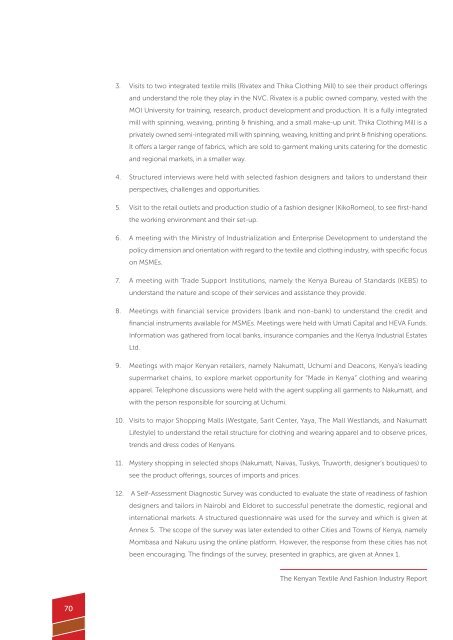You also want an ePaper? Increase the reach of your titles
YUMPU automatically turns print PDFs into web optimized ePapers that Google loves.
3. Visits to two integrated textile mills (Rivatex and Thika Clothing Mill) to see their product offerings<br />
and understand the role they play in the NVC. Rivatex is a public owned company, vested with the<br />
MOI University for training, research, product development and production. It is a fully integrated<br />
mill with spinning, weaving, printing & finishing, and a small make-up unit. Thika Clothing Mill is a<br />
privately owned semi-integrated mill with spinning, weaving, knitting and print & finishing operations.<br />
It offers a larger range of fabrics, which are sold to garment making units catering for the domestic<br />
and regional markets, in a smaller way.<br />
4. Structured interviews were held with selected fashion designers and tailors to understand their<br />
perspectives, challenges and opportunities.<br />
5. Visit to the retail outlets and production studio of a fashion designer (KikoRomeo), to see first-hand<br />
the working environment and their set-up.<br />
6. A meeting with the Ministry of Industrialization and Enterprise Development to understand the<br />
policy dimension and orientation with regard to the textile and clothing industry, with specific focus<br />
on MSMEs.<br />
7. A meeting with Trade Support Institutions, namely the Kenya Bureau of Standards (KEBS) to<br />
understand the nature and scope of their services and assistance they provide.<br />
8. Meetings with financial service providers (bank and non-bank) to understand the credit and<br />
financial instruments available for MSMEs. Meetings were held with Umati Capital and HEVA Funds.<br />
Information was gathered from local banks, insurance companies and the Kenya Industrial Estates<br />
Ltd.<br />
9. Meetings with major Kenyan retailers, namely Nakumatt, Uchumi and Deacons, Kenya’s leading<br />
supermarket chains, to explore market opportunity for “Made in Kenya” clothing and wearing<br />
apparel. Telephone discussions were held with the agent suppling all garments to Nakumatt, and<br />
with the person responsible for sourcing at Uchumi.<br />
10. Visits to major Shopping Malls (Westgate, Sarit Center, Yaya, The Mall Westlands, and Nakumatt<br />
Lifestyle) to understand the retail structure for clothing and wearing apparel and to observe prices,<br />
trends and dress codes of Kenyans.<br />
11. Mystery shopping in selected shops (Nakumatt, Naivas, Tuskys, Truworth, designer’s boutiques) to<br />
see the product offerings, sources of imports and prices.<br />
12. A Self-Assessment Diagnostic Survey was conducted to evaluate the state of readiness of fashion<br />
designers and tailors in Nairobi and Eldoret to successful penetrate the domestic, regional and<br />
international markets. A structured questionnaire was used for the survey and which is given at<br />
Annex 5. The scope of the survey was later extended to other Cities and Towns of Kenya, namely<br />
Mombasa and Nakuru using the online platform. However, the response from these cities has not<br />
been encouraging. The findings of the survey, presented in graphics, are given at Annex 1.<br />
The Kenyan Textile And Fashion Industry Report<br />
70


